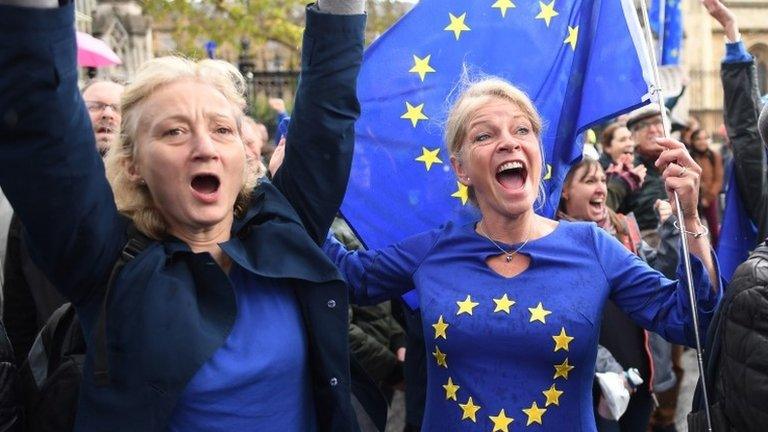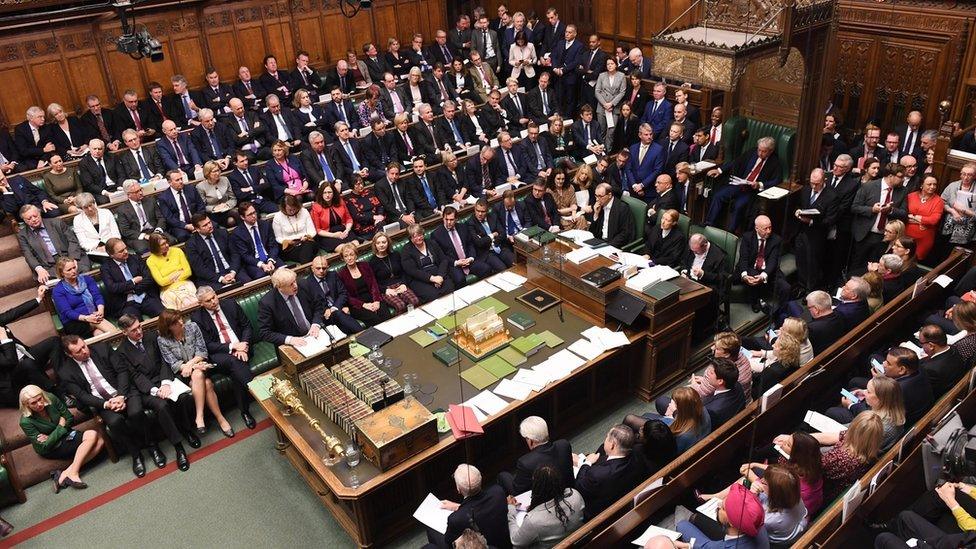Brexit delay voted through by MPs: What has just happened?
- Published

Pro- and anti-Brexit demonstrators argued outside Parliament as debate raged inside, too
The UK Parliament just sat on a Saturday for the first time in 37 years to try and get Prime Minister Boris Johnson's Brexit deal agreed.
What was supposed to be the deciding moment - a Yes or No on Brexit - wasn't. And now there might be another delay.
Having déjà vu? Here's what happened.

A planned vote on Boris Johnson's Brexit deal was pre-empted when MPs adopted an amendment which effectively requires the PM to ask for a third extension to the UK's planned departure.
This amendment aims to make sure that Britain can't leave the EU on 31 October without legislation in place.
So Mr Johnson has been forced to write to the EU, asking for another extension, but he added a second letter saying a delay would be a mistake.
He says he'll introduce legislation to leave at the end of the month, giving MPs a choice of his deal or no deal.

The UK parliament narrowly voted for a controversial amendment to hold off approval for the prime minister's new Brexit deal.
As a result, the PM is now required to ask the EU to extend the 31 October deadline - something he is dead set against.
How did we get here?
The background here is that on Thursday, Boris Johnson achieved what was thought unlikely - a revised Brexit deal with the EU.
But it has to be approved by the UK parliament. The deal negotiated by Mr Johnson's predecessor, Theresa May, was voted down three times and ended her term as prime minister.
In addition, a law passed weeks ago said that if Mr Johnson didn't have a deal done by midnight on Saturday, 19 October, he'd have to ask the EU for another extension.
Mr Johnson has always promised the UK will leave on 31 October, no matter what.
What happened on Saturday?
MPs were supposed to be voting on whether to approve the PM's deal with the EU in principle.
Mr Johnson presented his deal as the only option, confident he would win - even though he recently lost his majority in Parliament.
However, many MPs feared that the UK could still end up leaving the EU without a deal on 31 October if legislation to make Brexit a reality had not been approved in the meantime.
And one MP, Sir Oliver Letwin, came up with what our parliamentary correspondent called " a cunningly crafted proposition".
The Letwin amendment holds off on giving final approval for the UK-EU deal until after that detailed legislation - the Withdrawal Agreement Bill - is passed.
So without a deal by a legal deadline of Saturday, Boris Johnson must ask for that third Brexit extension.
Why would MPs want that?
Some were unhappy that Mr Johnson's deal was only unveiled two days before the vote - there wasn't much time to analyse it.
But Mr Johnson's government views the Letwin amendment as another way for opponents to try to stop Brexit altogether. If delayed, there could be an opportunity to pick apart the deal.
So for MPs who wanted to see more detail, or those who didn't trust the prime minister, the Letwin amendment was very tempting.
The arithmetic going into the vote was too close to call - just a handful of votes between the options.
Former PM Theresa May gave her first speech on Brexit since she resigned as prime minister - backing the deal, and cracking a joke that she had "a distinct sense of deja vu" of trying to get a deal passed.
Allow X content?
This article contains content provided by X. We ask for your permission before anything is loaded, as they may be using cookies and other technologies. You may want to read X’s cookie policy, external and privacy policy, external before accepting. To view this content choose ‘accept and continue’.
A key bloc of votes came, somewhat surprisingly, from the Democratic Unionist Party (DUP), the government's allies in Northern Ireland. DUP MPs had been extremely critical of Mr Johnson's deal.
However, they backed the Letwin amendment because it gave them more time to scrutinise its impact.
The amendment passed by 322 votes to 306, making another delay to Brexit the most likely outcome.
So what next - an extension?
Probably - but with Brexit, nothing is certain.
Under another piece of legislation called the Benn Act, if Parliament hadn't passed a deal by midnight on 19 October, Mr Johnson was obliged to ask the EU for an extension.
It's the law - but the prime minister disagrees.
Late on Saturday evening, Mr Johnson sent the request to the EU - but without his signature.
The request was accompanied by a second letter, signed by Mr Johnson, which says he believes that a delay would be a mistake.
Allow X content?
This article contains content provided by X. We ask for your permission before anything is loaded, as they may be using cookies and other technologies. You may want to read X’s cookie policy, external and privacy policy, external before accepting. To view this content choose ‘accept and continue’.
What will the EU make of this? Will it grant a third extension to a UK government that doesn't want it anyway? France and Ireland have already warned that a further delay isn't guaranteed.
EU Council President Donald Tusk confirmed that he had received the extension request, saying he would now consult EU leaders "on how to react".
For now, the UK government will work to get its legislation through Parliament, starting on Monday - and it may still get the final approval it seeks in time for Brexit to happen on 31 October.
- Published19 October 2019

- Published21 October 2019

- Published19 October 2019

- Published19 October 2019